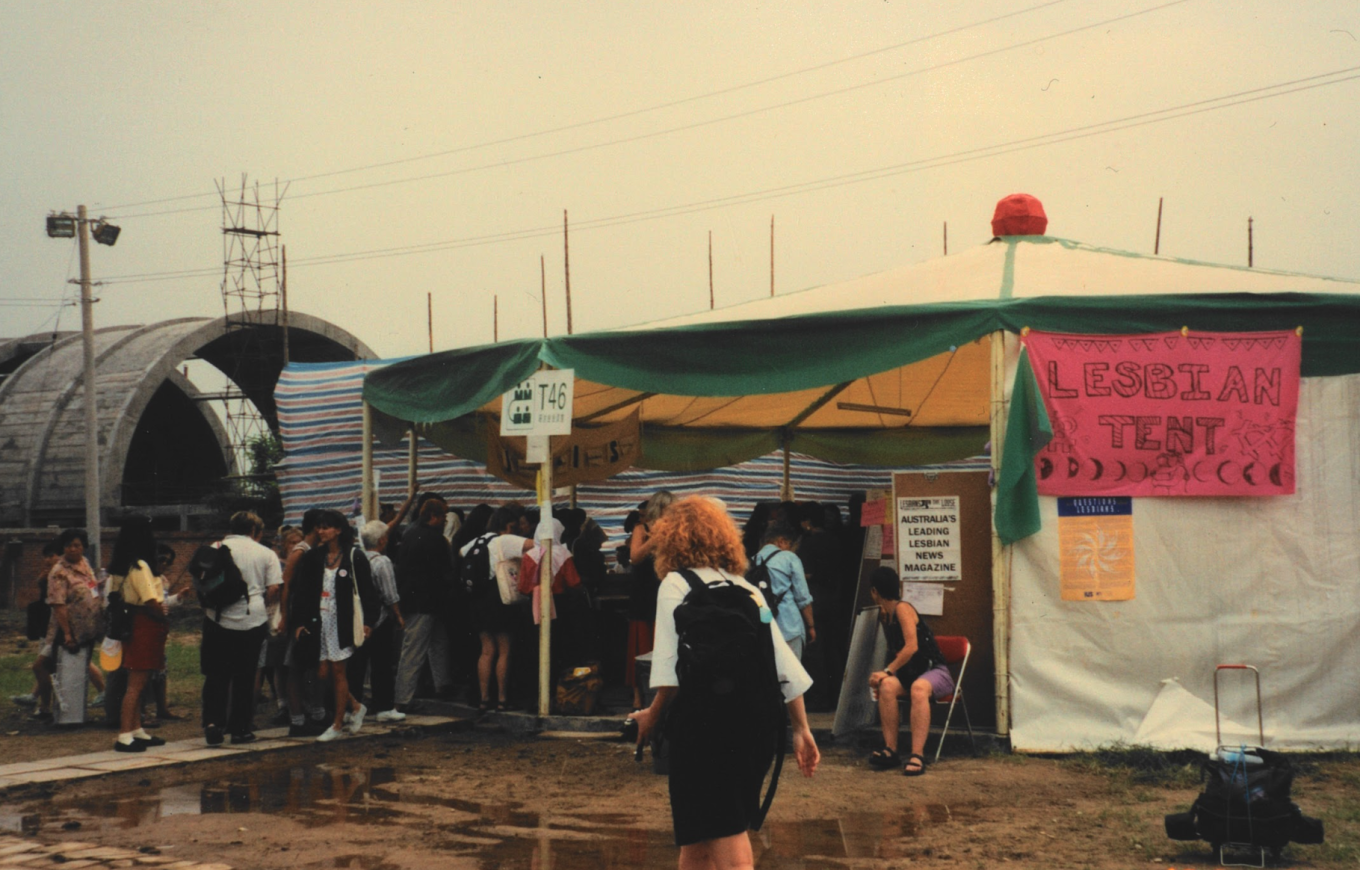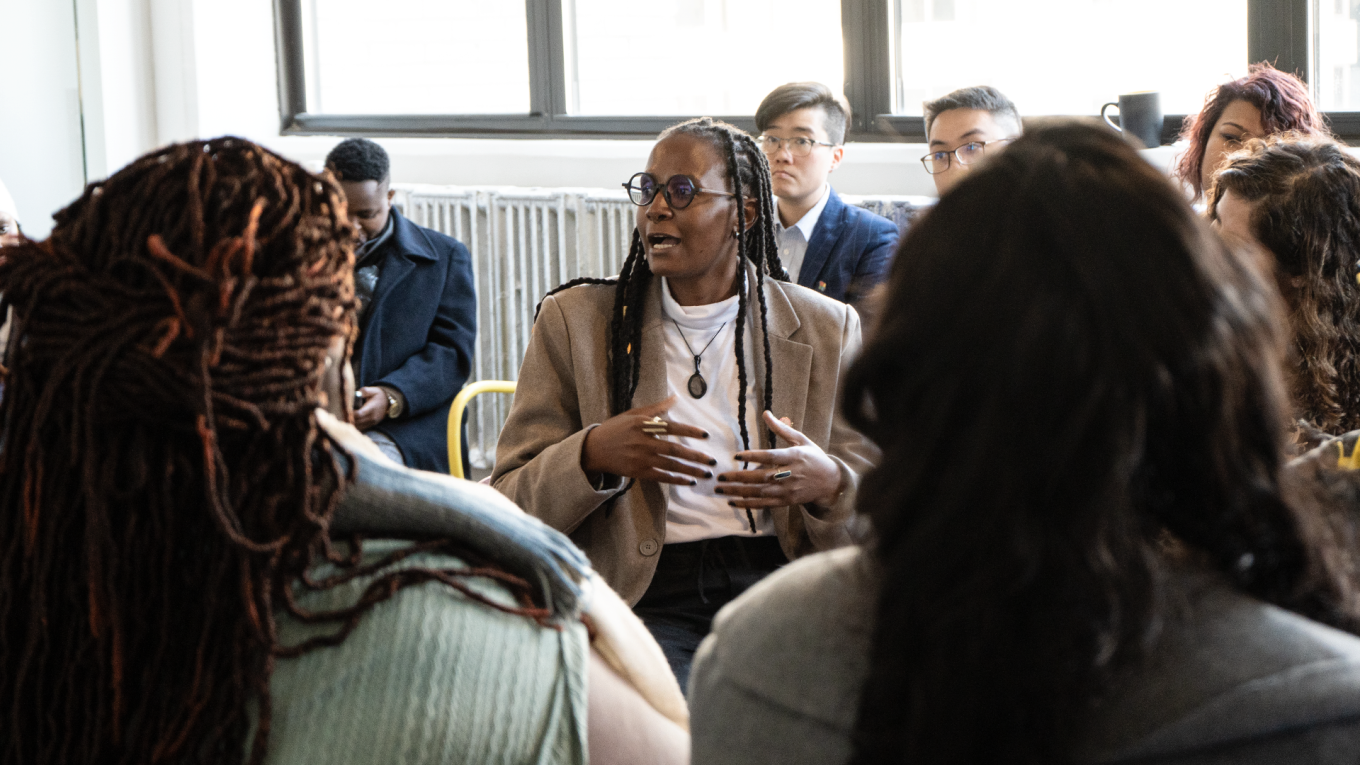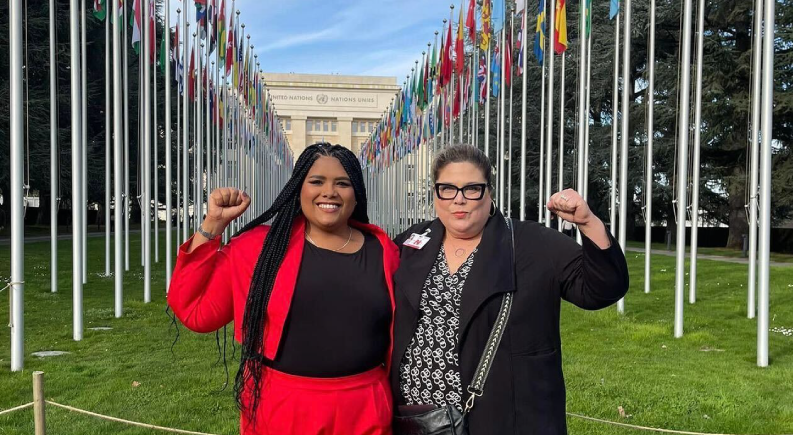
Insights
Why Gender-Focused Philanthropy Must Be Inclusive and Expansive
Region(s)
TOPIC(s)
Type
Commentary
Author(s)
Publish Date
March 20, 2024
Share
Throughout our 34-year history, Outright International has proudly identified as a feminist organization and advocated for the rights of lesbian, bisexual, transgender, intersex, and queer (LBTIQ) women.*
Outright was founded by queer women, co-hosted the first “lesbian tent” at the 1995 World Conference on Women in Beijing, and as Secretariat of the United Nations (UN) LGBTI Core Group, works closely with the Women's Rights Caucus and LBTI Caucus at the UN Commission on the Status of Women and the NGO Working Group on Women, Peace and Security. Outright has partnered with hundreds of grassroots LBTIQ activists in dozens of countries around the world to address gender-based violence. In 2022, we launched LBQ Connect to support and amplify the activism of LBQ activists in the Global South and East. We have also prioritized integrating transgender voices and issues into our work, including featuring trans speakers at our annual OutSummit conferences, focusing on trans-led groups in our grantmaking and training/fellowship programs, and developing initiatives like our Global Trans Rights Program and Celebrating Legal Gender Recognition campaign to highlight advocacy priorities for trans communities globally. Recently, Outright launched our inaugural Global Intersex Rights Program and is providing platforms for intersex women to advocate at the UN and in regional fora around ending intersex genital mutilation and discrimination based on sex characteristics.

Activists in front of the Lesbian Tent in Beijing.
As we commemorate Women’s History Month and International Women’s Day, engage at the 68th UN Commission on the Status of Women, and celebrate Transgender Day of Visibility during March, it is critical to acknowledge and affirm that gender equality and justice cannot truly be achieved without including and uplifting LGBTIQ people. Likewise, the wider LGBTIQ movement must prioritize and support LBTIQ women. Here’s why:
As explained by UN Women, systemic gender-based power imbalances and patriarchal social norms that reinforce gender roles and stereotypes not only impact cisgender, heterosexual women but also compound discrimination and marginalization for queer and trans people. LBTIQ women are routinely underserved and under-resourced and encounter homophobia, biphobia, transphobia, intersexphobia, and sexism in society overall, within democracy and human rights movements, and even in queer and feminist spaces. This overlapping oppression exacerbates their vulnerability to various forms of violence, discrimination, and economic disenfranchisement. For example, in 2022 Human Rights Watch detailed ten key areas of human rights abuses faced by LBQ+ women globally, including the denial of land and property rights, restrictions on movement and existing in public spaces, violence based on gender expression, lack of access to health services, forced marriage, lack of parental rights or the right to create families, violence and discrimination at work, lack of legal recourse or access to justice systems, denial of the right to asylum, and targeting of LBQ+ human rights defenders.

Mino Likwasi, an LBQ activist from Zambia, at a Commission on the Status of Women event CSW68.
Sadly, some organizations and funders dedicated to gender equality and improving the lives of women still do not meaningfully include - and sometimes deliberately exclude - queer, trans, and intersex women. At the same time, LGBTIQ groups have historically been dominated by - and funding disproportionately earmarked toward the needs of - cisgender gay men. Yet LBQ+ activists have reported several unique risks related to their work, including gendered economic marginalization; lack of access to international networks of support; discrimination in employment, health care, education, housing, social protection and legal gender recognition; and restrictions on freedoms of expression, association and assembly. In addition, while trans activism is growing rapidly around the world, trans organizations are often operating with very few resources. 2017’s State of Trans Organizing report found that the majority of trans groups globally had annual budgets of less than $10,000 and frequently lack paid staff, and more than 75% of trans groups requested training related to healing from trauma and preventing burnout. For intersex women activists, two ongoing challenges are a severe dearth of funding for their movement (see below) and remaining hidden due to shame and stigma caused by a lack of awareness, understanding, and acceptance for intersex people in many societies.
Moreover, rising political conservative and nationalist movements – sometimes explicitly supported by governments or religions – have become more visible and vocal on the global level in promoting patriarchal values and constrictive ideas about gender identity. As restrictions proliferate around freedom of expression, association, and peaceful assembly, women - especially those whose sexual orientations and gender identities lie outside rigid, binary gender norms - are disproportionately impacted. An increasingly organized, transnational anti-gender movement, whose proponents run the gamut from the Vatican to Evangelical Christian and Muslim fundamentalists to trans-exclusionary so-called feminists, has especially targeted sexual and reproductive rights and trans people. As of this writing, the ACLU is tracking nearly 500 anti-LGBTQ bills across the US so far in 2024 and Human Rights Watch and InterACT have reported many of these bills targeting gender-affirming care for transgender youth include an explicit exception for surgical procedures performed on intersex children—which are medically unnecessary, often non-consensual, and violate rights to health, bodily integrity, and freedom from torture and ill-treatment. As well, Transgender Europe’s annual trans murder monitoring project documents consistently high levels of deadly violence against trans people - with trans women comprising 94% of the victims in 2022-2023.
Despite these challenges, LGBTIQ and gender equality movements have greatly accelerated legal and social progress around the world in the last few decades, often led by extraordinary LBTIQ women activists doing groundbreaking work. In 2022, St. Lucia’s Parliament passed a landmark LGBTIQ-inclusive Domestic Violence Act - the first law of its kind in the Caribbean, thanks to the leadership of LBTIQ activists with local and regional groups like Raise Your Voice St. Lucia, United and Strong, and Eastern Caribbean Alliance for Diversity and Equality (ECADE). In Taiwan, women’s rights and LGBTQ+ rights organizations led by queer women formed the Marriage Equality Coalition in 2016 to advocate for marriage equality, which was legalized in 2019. Now the coalition has become Taiwan Equality Campaign and is working to advance gender and LGBT equality more broadly in Taiwan. In Ukraine, LBQ women activists have been first responders and leaders in the relief and recovery efforts to reach women and LGBTIQ people after Russia’s invasion in 2022.
Intersex women have made great strides in places like Greece, where activists from Intersex Greece helped pass a law banning surgery on intersex children under age 15 in 2022 - one of only nine such laws in the world - and the UN Human Rights Council is currently considering a pending (first-ever) resolution on intersex rights, due to interventions from leading intersex women activists from Outright, ILGA World, and several intersex-led organizations. In addition, research shows that trans movements are growing rapidly and trans groups are working in every region of the world, winning important victories and making significant gains in challenging discrimination, stigma and violence. Finally, the Fast Track or Backtrack report from the Alliance for Feminist Movements highlights the role feminist groups have played in driving toward gender equality in Argentina, Canada, Malawi, Nepal, and Uruguay, among other places.

Kimberly Zieselman (right), Outright's Senior Advisor for Intersex Global Rights, and Crystal Hendricks (left), ILGA World's Programme Officer - Sex Characteristics, at UN Geneva attending meetings on Intersex rights in March 2024.
Unfortunately, LGBTIQ and feminist movements are severely under-resourced, especially in the Global South:
- Less than half the total funding for LGBTIQ issues goes to programs outside the US and Canada, and only 5% of foundation giving - and 1% of government funding - goes to human rights causes globally to support LGBTIQ communities.
- In 2021-2022, only 4% of bilateral Official Development Assistance (ODA - contributions by donor government agencies to developing countries) was dedicated to programs with gender equality as the principal objective.
- Groups led by and focusing on queer women and intersex and transgender people are particularly under-resourced - only 5% of global LGBTIQ funding is directed to LBQ communities and 40% of LBQ groups have an annual budget of $5,000 or less.
- In 2019-2020, only 12% of all funding for LGBTI issues outside the US specifically focused on trans communities and only 3% focused on intersex communities.
Meanwhile, the anti-gender movement globally received $3.7 billion in philanthropic support between 2013-2017, more than triple the $1.2 billion received by LGBTIQ movements during the same period. As just one example, openDemocracy has documented that from 2007 to 2020, US evangelical groups spent at least $54 million in Africa alone “to influence laws, policies, and public opinion against sexual and reproductive rights."
Centering LBTIQ voices, addressing their unique needs, and allocating more resources toward groups led by and focused on LBTIQ women make gender-focused philanthropic initiatives more inclusive, effective, and impactful and enrich our movements as a whole. Thankfully, feminist donors like Astraea Lesbian Foundation for Justice, Mama Cash, Global Fund for Women, and other members of the Prospera International Network of Women’s Funds mobilized $1.2 billion between 2011-2021 to women’s rights movements around the world. Moreover, these feminist funders focus on building meaningful solidarity, shifting power to historically marginalized communities, and providing flexible funding directly to local activists and organizations. In addition, the Global Philanthropy Project tracked $576M flowing to LGBTIQ causes in 2019-2020, an increase of 3% overall and 38% in the number of grantees receiving funding globally.
At Outright, our own grantmaking has expanded significantly: in our current fiscal year, we will distribute approximately $3.6M to local and national partners around the world and have granted nearly $650,000 to 57 local partners through our LBQ Connect program over the past year and a half (ten of whom received funding for the first time). We have also been extremely fortunate to work with donors who have been at the forefront of inclusive, feminist philanthropy for many years. But much more intersectional, progressive investment is needed globally to protect the gains we have made and achieve our vision for an inclusive and expansive gender justice and equality that uplifts everyone.
The bottom line is strong, vibrant, and well-funded organizing by LBTIQ women is essential to advance human rights for all LGBTIQ people and to improve the lives of all women and gender non-conforming people. Women's rights are LGBTIQ rights - and vice versa - and they are all human rights. Our lives and our rights are intertwined, and our activism and philanthropy must be, too.
*Please note throughout this piece, references to lesbian, bisexual, transgender, intersex, and queer (LBTIQ) women are intended to be inclusive of nonbinary or gender non-conforming people who relate to an LBTIQ identity.

Take Action
When you support our research, you support a growing global movement and celebrate LGBTIQ lives everywhere.
Donate Now